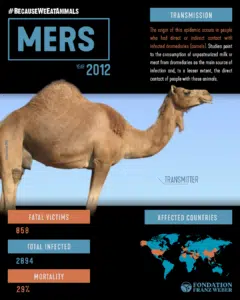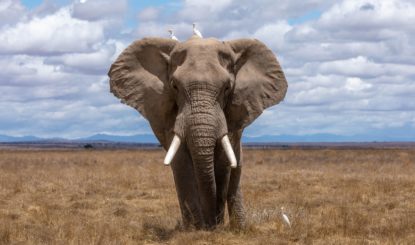#BecauseWeEatAnimals: MERS
Dromedaries: Who would have thought that these amenable animals would become the carriers of a dangerous disease that for many people ends with death? The viral disease MERS (Middle-Eastern Respiratory Syndrome) first broke out in Saudi Arabia – 80% of all cases reported worldwide so far have occurred in the country. The consumption of camel meat or milk is one of the main transmission paths of the virus. There is no vaccination or specific treatment against the disease.
Origin: MERS is a zoonotic disease caused by a coronavirus (MERS-CoV). A zoonotic disease is one that is transmissible from animals to humans. This epidemic originated in people who were in direct or indirect contact with infected dromedaries (camels). Studies indicate that the sources of infection include transmission via the consumption of non-pasteurised camel milk and meat, and, to a lesser extent, direct contact with dromedaries (Omrani, Al-Tawfiq and Memish, 2016). It is thought that dromedaries are secondary hosts of the virus, which could have originated in some bat species.
Country: The first case was described in Saudi Arabia, and 80 % of reported cases to date have been in this country. The remaining cases were also recorded in the Middle East, or in travellers who had been there.
Year: Since
Fatality: Around 2,494 people infected since 2012, causing 858 deaths (WHO). No specific treatment has been developed to date.
Symptoms: Fever and chills, cough, shortness of breath. Less common: cough with blood, diarrhoea and vomiting.
Social and economic implications:
After Saudi Arabia, South Korea was the country second hardest hit by MERS. Since the virus appeared there, 16,000 people were reported to be in quarantine for possible exposure; 186 hospitalisations and 38 deaths were also announced. Just one week after the outbreak, 120,000 tourism trips to South Korea were reported cancelled. By the end of the crisis, the hotel, service and transport sectors had reported total losses of 2.6 billion dollars. The projected economic growth in South Korea fell from 3.8 % to 3.1 % in 2015 as a result of the virus (Heesoo Joo et al., 2019).
More information:
- This short video, published by the WHO (World Health Organization) in 2018, explains the illness MERS (Middle East Respiratory Syndrome) in under 2 minutes. Find out how it is transmitted from animals to humans and if it is possible to have a human-to-human transmission, as well as what the signs and symptoms of this illness are and why it is difficult to detect cases early. Link to the video
- Read more on our project page «Corona and other pandemics»


